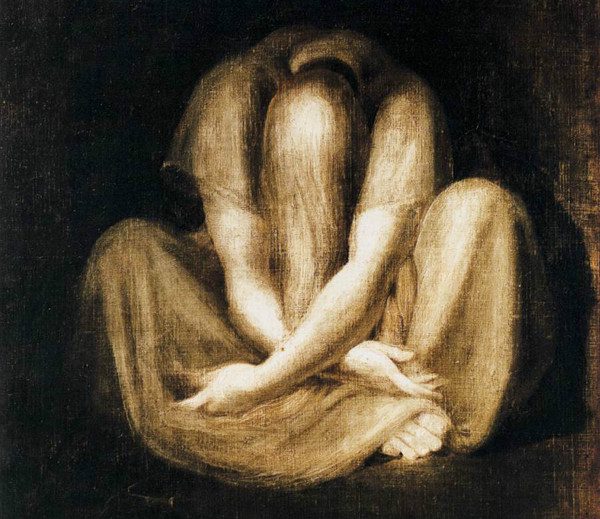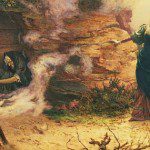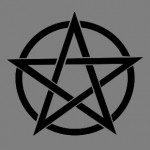I’ve been thinking a lot lately about the Witchcraft related tenet “to keep silent.” It’s a rule (or suggestion) I have a lot of problems with from time to time. Part of that’s because I’m an extremely public Pagan. I write books, this blog, go to festivals and teach, and I do all of this under my own name. That I’m a practicing Witch is certainly a part of my life I’m not quiet about, and probably never will be. It’s far too late to put the genie back in the bottle, and people who are close to me most likely suffer guilt by association. My public practice has most likely outed my wife to anyone who cares.
“Silence” in just about every aspect of early Modern Witchcraft made a lot of sense. People could lose children and jobs due to involvement in the Craft (a situation that has improved, but probably still happens to some degree), and the instruction “to keep silent” was most certainly about keeping the identities of early Witches a secret. Not every Witch “kept silent,” obviously Gerald Gardner was extremely loud about his practice, as was Robert Cochrane, and “Witch shouting” was taken to an entirely different level less than ten years later by Alex Sanders and Sybil Leek.

Those who could afford to share their Craft were (mostly) doing Modern Witchcraft a favor, so don’t take my comments as disparaging ones. Certainly some of Gerald and Alex’s publicity seeking was ill-advised, and had disastrous consequences for some involved, but mostly it probably turned out OK. A lot of us are here today because they were loud and refused to keep silent.
In its early days, Modern Witchcraft was basically an “initiation only” spiritual path, and keeping silent was often about the rituals and practices that could only be accessed by initiates. Most Witches who become a part of a tradition take some sort of oath or vow to safeguard the secrets they’ve been given and not share them with outsiders. Keeping silent applied to most every aspect of coven life, and those who did write and speak about their Craft mostly did it in the broadest strokes possible. That’s why there were no “how to” or “ritual” books until the early 1970’s.
Many of those first “ritual books” were full of oath breaking highlighting certain people’s inability to keep silent. The most notorious (and influential, at least for a while) was Lady Sheba’s Book of Shadows (and later the expanded Grimoire of Lady Sheba). On the plus side, Sheba’s entry into the mall bookstore resulted in several people writing books of Pagan and Witch ritual that did not reveal oathbound things, and I’m certainly thankful that people like Raymond Buckland, Starhawk, Margot Adler, and Scott Cunningham chose to break their silences.
I bring up some of this because I’m currently writing a book on what I think of as the Five Mysteries of Witchcraft. In the book I write about Gardner’s alleged initiation, the cone of power, initiations and elevations, drawing down the moon, and the great rite. I’m guessing that anyone who reads this blog is probably familiar with those five things/terms. I don’t think any of them are oathbound secrets, nor are they things unique to just one or two strains of the Craft. Every Witchcraft tradition I’m familiar with has an origin story, raises energy, has some sort of initiation rite, interacts with deity, and does something that celebrates the mysteries of life and existence.
Of course it’s completely possible to write about such things in a way that breaks an oath. Taking a tradition’s version of those rites and sticking them into a book is certainly not “keeping silent” in the way that I and most other Witches understand it. Nor would be taking events from an oathbound situation and sharing them with the general public, both instances are huge “no no’s” and would certainly break certain vows. I was rankled because it was being suggested that by simply writing about these things in 2017 I was breaking an oath, regardless of what words I used or how I wrote about such things (or will write-this is book is only 25% written!).*

I’ve been doing initiation rituals for twenty years now. I wrote one for my first college student group when my wife was still a teenager, and later wrote one for my more eclectic coven (and a version of that is in my first book The Witch’s Athame and is excerpted here). Even Druids are familiar with initiation rituals, John Beckett wrote about them before he and I were ever on Patheos Pagan. Just seemed silly to me that this was someone’s line in the sand.
But “to keep silent” has been with me for other reasons lately too, most notably the giant Donald Trump mass-binding that took place last month. I couldn’t figure out for the life of me figure out why anyone would want to publicize such an undertaking. If you believe in your magick I think you should just do it and not turn it into a reality show, because alerting someone to what you are doing means they can most likely counter it (and bounce it back towards the people doing the binding). And I’m sure plenty of Christians (and even a few Pagans) out there who like Donald Trump worked on doing exactly that the minute this binding spell was cast. I think it would have been more effective if it had stayed in Witch-only spaces, but that’s not how our society works today.
If I was ever going to do a binding spell on someone I certainly wouldn’t make them aware of it, nor would I email people about it or share what I was doing on social media. But I see this all the time in the various Witch wars that pop up here and there. Magick works best without a paper (or electronic) trail.
And it goes without saying that Witches are agents of change, and should certainly never be silent when confronting injustice. When we see things that are most clearly wrong we should take active efforts to fix those things. I’m not always sure that this means sharing every good deed we do. More important than a pat on the back is the energy we are putting out into world to facilitate change.
If I had to sum up what to keep silent about I’d say don’t break your oaths, don’t talk about what you do in the circle or who you do it with unless you have permission, and keep your magickal operations on the down-low. Speech is silver, but silence can still very much be golden.
*Hilarious aside, the place I made a note of my next book was a “secret” group, and that information was then later publicly posted in social media (though in fairness the individual did not attach my name to it). What we keep silent apparently varies from person to person.

















